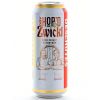Bitburger Brauerei (with Deschutes Brewery) - Dry Hop’d Zwickl
-
ABV:
4.9% -
Bottle Size:
500-ml -
Serving Temperature:
42-47° F -
Suggested Glassware:
Stange, Pilsner Glass, Mug -
Hops:
Bitburger Siegelhopfen, Citra, Mosaic
Zwickelbier is a variation on kellerbier, which is a German style known for being unfiltered and matured in cellars in wood casks left not completely sealed, which allows much of the carbonation to escape. Zwickel (or Zwickl) casks, however, are usually sealed for a while before bottling, allowing more carbonation to build up. They are also usually crafted to be a bit lighter in hop flavor, though this dry-hopped version from Bitburger and Deschutes bucks that convention. Pouring a well-hazed medium copper-amber color, this unfiltered lager offers up aromas of light caramel, hay, doughy and bready notes, hints of orchard fruits, and touches of herbal spice. On the palate, look for the core to come across as a classic zwickel, offering generous notes of lightly toasted bread and mild caramelization, with a satisfying smoothness thanks to its unfiltered nature. Shot through it all is a good dose of hops, delivering a multifaceted profile. There’s a distinctly fruity quality here with flashes of citrus and stone fruits, but in an unusual tandem with noble hops offering a more grassy, spicy edge. For pairing options, you can’t go wrong with fried chicken, schnitzel, and grilled hot dogs or brats with German mustard or sauerkraut. Pizza, empanadas, soft pretzels, or chicken pies sound good to us too. Prost!
The brewery which would become the icon known today as Bitburger got its start modestly back in 1817 when a small brewery was founded by Johann Peter Wallenborn in Bitburg, at the southern end of the Eifel mountains in the west of Germany, not far from the Luxembourg border. In 1842, Ludwig Bertrand Simon married Johann’s daughter and took over ownership, naming the brewery Simonbräu, by which it would be known well into the 20th century before transitioning to Bitburger. In 1876, their son Theobald took over operations at the age of 29, and it was under his leadership that the brewery produced their first pilsner in 1883 and began exporting in 1886.
The brewery was cutting edge for its time, with two steam engines in operation by 1896, as well as a refrigeration system coming online that year, as well. A brewery laboratory was built in 1921 to ensure quality and consistency – something that is commonplace now, but not so much back then. By the late 1930s, the brewery had won a gold medal for their Bitburger Pils at the Paris World Expo, and had surpassed 85,000 barrels of annual production.
Sadly, as was the case for so many European breweries, the Bitburger brewery was completely destroyed in WWII. But, reconstruction began almost as soon as the war concluded, and in 1949 production resumed, albeit initially at about half their prewar capacity. Over the course of the next several decades, the brewery continued to grow, with new brewhouses built in 1958 and 1980. In 1990, as the craft beer renaissance was picking up in the U.S., Bitburger established an experimental small-production facility to develop new recipes and styles, and to test new malt and hop varieties. In 2013, the operation was named Craftwerk Brewing.
Additionally, in recent years Bitburger has partnered with American brewers to produce some unique products. Collaborations in the craft brewing world are nothing new, but international collaborations spanning an ocean are far less common and, dare we say, often more interesting. Long-time club members may remember Bitburger’s Triple Hop’d Lager brewed in partnership with Sierra Nevada. They’ve also partnered with Oregon’s Deschutes Brewery, including a limited-release version of a fresh-hopped IPA called Chasin’ Freshies (brewed in Oregon with Bitburger’s Siegelhopfen proprietary hop blend, as well as German Callista), as well as this month’s featured beer, Dry Hop’d Zwickl, brewed in Germany with American Citra and Mosaic hops. It’s an unusual take on a relatively uncommon style, and we hope you enjoy it as much as we did.

Unmatched Variety by style, brewery & country
Choose from Five different Beer Clubs offering unmatched variety by brewery,
country of origin, and beer style to suit your specific tastes.


